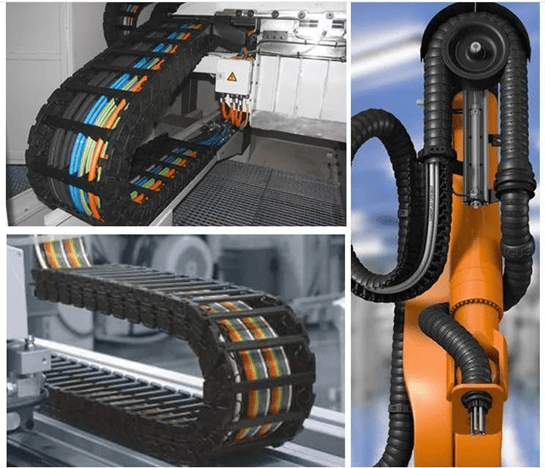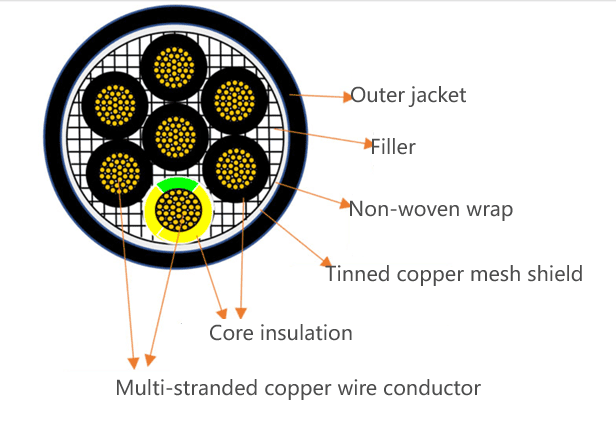Drag Chain Cables: The Complete Guide to High-Flex Industrial Cables | YUEDAO Manufacturing

What Are Drag Chain Cables?
Drag chain cables (also known as tow or energy chain cables) are ultra-flexible cables designed for high-frequency reciprocating motion, capable of withstanding millions of bends without wear or fracture. With the global industrial automation market growing at an 8.5% CAGR through 2030 (Grand View Research), demand for drag chain cables as critical components continues to surge.
5 Core Advantages of Yuado Drag Chain Cables
-
Extreme Flexibility: Endures over 5 million bending cycles (tested to ISO 11801 standards).
-
Tensile & Abrasion Resistance: Central tensile reinforcement + armored inner jacket increases tensile strength by 40%.
-
All-Environment Protection: Resists oil, water, and UV radiation, operating from -40°C to +105°C.
-
EMI Immunity: >85% tinned copper shielding exceeds industrial EMC standards.
-
Customization: Supports bespoke configurations in conductor count, length, and jacket materials (PVC/TPE).
7 Core Technologies Behind YueDao Drag Chain Cables
| Technology | Innovation |
|---|---|
Tensile Structure |
High-density central/bilateral fillers ensure stability (tensile strength ≥200N/mm²). |
Conductor Design |
Ultra-fine 0.1mm oxygen-free copper strands, diameter tolerance ±0.004mm, resistivity ≤0.0175Ω·mm²/m. |
| Insulation | High-pressure molded PVC/TPE insulation, withstands >3kV voltage, zero interlayer adhesion. |
Stranding |
Optimal lay length around tensile core, minimum bending radius 7.5×cable diameter. |
Inner Jacket |
Armored, extruded inner jacket replaces loose fillers, improving torsion resistance by 30%. |
Shielding |
>85% tinned copper braid with ≤30°编织角度, blocking 99% EMI. |
| Outer Jacket | NBR-PVC hybrid material, abrasion resistance >5000 cycles (DIN 53516), IP67 oil resistance. |
Key Applications for Drag Chain Cables
-
Industrial Robots: Wiring for 6-axis arms, enduring 10+ bends per minute.
-
CNC Machines: Powering moving parts (tool changers, rails) in oil-heavy environments.
-
Automated Production Lines: AGVs (Automated Guided Vehicles), conveyor belts (lifespan ≥5 years).
-
Warehouse Logistics: High-frequency cable management for stackers and sorting systems.
-
Special Equipment: Firefighting platforms, port cranes with anti-sway cabling.
Yuado Drag Chain Cable Series
| Model | Structure | Applications | |
|---|---|---|---|
| TRVV | PVC insulation + PVC jacket, unshielded |
General equipment (≤380V power). |
|
| TRVVP | PVC insulation + shielded + PVC jacket |
Precision sensors (EMI resistance). |
|
TRVVSP |
Twisted pair + overall shielding |
Industrial Ethernet (Profinet/EtherCAT) |
|
| RVVYP | Oil-resistant jacket (hydraulic/lubricant) | Automotive, injection molding (high-temperature oil environments). |
How to Select Drag Chain Cables
-
Motion Parameters:
-
Bending radius ≥7.5×cable diameter.
-
Acceleration ≤50m/s².
-
-
Environmental Needs:
-
Choose RVVYP for oil/grease exposure.
-
UV-resistant jackets for outdoor use.
-
-
Electrical Requirements:
-
TRVVSP for signal integrity.
-
≥25mm² cross-section for high-current loads.
-
Certifications & Performance Data
-
Compliant with ISO 11801, UL AWM, and RoHS standards.
-
Tested lifespan: Insulation resistance >100MΩ after 10 million bends (IEC 60227).
-
Case Study: An automotive welding line using TRVVP reduced failures by 60%, saving $17k annually.
FAQ Section :
Q: How do drag chain cables differ from standard cables?
A: Drag chain cables use 7 core technologies (e.g., fine-strand conductors, armored jackets) to survive millions of bends vs. standard cables (≤50k cycles).
Q: How to calculate minimum bending radius?
A: Formula: Bending radius = Cable diameter × 7.5. Example: 10mm cable requires ≥75mm radius.
Q: Temperature limits for drag chain cables?
A: Standard: -40°C to +105°C. High-temp versions (silicone jackets) available up to +150°C.
Leave a Reply
- HYA 50×2×0.4 Communication Cable: Reliable Solution for Guangzhou Surveillance Systems
- Why Does Your EV Stop Charging Suddenly? Let’s Troubleshoot!
- Yuedao Intelligent Empowers Guangzhou Metro to Set World Record for Fastest Subway Speed
- Become Our Local Partner - Expand Your Market with High-Quality Cables & Wires

